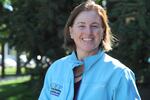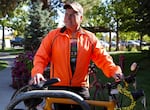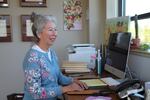Lynn McDonald practiced medicine in Bend for 27 years. His wife, Jan, said he excelled in the often-chaotic, fast-moving environment of an emergency room.
“The great thing about emergency room medicine, which seemed to fit him, was because he was a really good diagnostician," she said, "he would say that he really enjoyed trying to figure it out.”
But by the early 2000s, his wife says, Dr. McDonald began saying he no longer enjoyed the job. He worked all the time.

Jan McDonald was married to Bend physician Lynn McDonald for decades. They had twins and a residential development business when he took his life while suffering symptoms of burnout.
Kristian Foden-Vencil / OPB
“He would come home, and he would be exhausted, emotionally exhausted — even to the point of being somewhat sarcastic," she said. "You could tell that he really did not love who he was.”
McDonald tried to change his career by investing in a residential development called The Shire, where the homes had thatched roofs and the tool sheds looked like hobbit holes. It was whimsical, his wife said, and it made him happy. But then came the crash of 2008. McDonald eventually killed himself.
“I think he was getting burned out big time the last six years of his life,” she said.
Looking back, Jan McDonald wishes she'd done more. But at the time, she was worried that raising the alarm would put her husband's license in jeopardy. And while his is an extreme example, research shows that half of all doctors exhibit at least one symptom of burnout.
Some just say they’re overly tired. But others have also become disinterested in work and lost any sense of innate joy in helping other people.
And that burnout rate appears to be increasing.
A group of physicians in Central Oregon are addressing the problem by ensuring their troubled peers receive psychological help anonymously and free of charge.

Dr. Frances McCabe said physician burnout is tough. "Your family gets the short end of the stick. You don’t take care of yourself, you don’t exercise enough. You eat to survive instead of eating healthy. It doesn’t take long to turn yourself into a train wreck."
Kristian Foden-Vencil / OPB
Dr. Frances McCabe, an ER physician at St. Charles Health System in Bend, says she started to feel the symptoms of burnout after agreeing to help establish the hospitals' new $80 million electronic records system — while still working her emergency room shifts.
“Things really do start to suffer," McCabe said. "Your family gets the short end of the stick. You don’t take care of yourself, you don’t exercise enough. You eat to survive instead of eating healthy. It doesn’t take long to turn yourself into a train wreck. And over the last couple of years, I was definitely getting to that point.”
McCabe said she was lucky — the records system she was helping create had a deadline. So after it was done, she could pull back from work and spend more time with family. But in the thick of things, she was worried about possibly making mistakes.
“Something happens and you go, ‘Whoa, If I hadn’t asked that one more question, I might have sent that one person home. And this person definitely should not have gone home,"' she said. "So second guessing of yourself is a common theme."
McCabe said medicine used to be practiced at a much more leisurely pace. Doctors had the time to get to know their patients. Now many are rationed to 20 minutes, and it's tough to build a relationship in that time.
She said there’s also all the new technology doctors have to learn, the constant threat of lawsuits, the piles of paperwork, large college and medical school loans to repay and ever more complex medicine as people now live well in to their 80s and 90s.
“They may be on a multitude of new medications, which are aggressively advertised on TV: 'Go ask your doctor for this medicine, go ask your doctor for that medicine,'" she said. "And I’m watching those commercials going, 'Don’t ask your doctor any of those medicines.'
"... It’s not any one thing. It’s everything piling up on you.”
McCabe sits on the professional practice evaluation committee at St. Charles, where she deals with doctors who are frustrated, overworked and sometimes even rude to their team.
“There was a time in medicine when that was OK. It was almost an expectation if there was a surgeon who was dissatisfied with conduct or outcome, [they] might yell or even throw and instrument in an ER," she said. "That is considered disruptive physician behavior, and there is really no tolerance for that anymore."
The program established by the Central Oregon Medical Society allows health-care providers to get up to eight free, anonymous psychological visits a year.

Dr. Matt Eschelbach has sat on physician oversight boards, “We had a provider who would go in cycles and I knew when and when he was not on his medication. Just based on the patient complaints. Today, we’re more apt to go, ‘You need help.”
Kristian Foden-Vencil / OPB
Society president Dr. Matt Eschelbach said he thinks the old way of doing things is no longer sufficient. Years ago, a doctor who was rude with a patient might have gotten a brief scolding from a supervisor. Today, that kind of behavior would receive a different response.
“Today, we’re more apt to go, ‘You need help,'” Eschelbach said.
He said there are three basic signs of burnout among doctors: being so physically and emotionally tired that it’s hard to continue working; not seeing patients as people anymore — regarding them as just "the broken leg in bed two," for example; and no longer getting any joy from the job.
He cites a study from the Mayo Clinic in which researchers interviewed almost 700 physicians. "Fifty percent of them had at least one symptom of burnout," he said. "Exhaustion, depersonalization, loss of accomplishment. Fifty percent."
Eschelbach said he’s learned a few tricks to combat burnout over the years, say when he’s working with an ER patient and they've been waiting for lab results for three hours.
“I can do a few things. I can go over to the lab and start yelling … Or I can understand that in a busy hospital, it’s the price you pay at that moment, that your labs are a little bit late because somebody else is a little bit sicker than your patient,” he said.
Eschelbach said his wife also gave him a smart watch for Christmas. At first, he thought it was a fancy waste of money. But then he’s programed the watch to tell him when his heartrate starts to increase.
“It tells me when I’m under stress, and I take a couple of minutes for myself. And I say to my associate or my partner: ‘I’m going to take five. I need a break,’” he said.

Bend psychiatrist Angelina Montoya has counseled a half-dozen doctors under the Central Oregon Medical Society program.
Kristian Foden-Vencil / OPB
Bend psychiatrist Dr. Angelina Montoya has counseled a half dozen doctors through the Central Oregon Medical Society program. She said some physicians find it difficult to put into words what's bothering them. But with some analysis, they figure things out, she said.
“Some people have stopped working. With some, they’ve decided to try to find work that maybe will be less stressful within their field. And with some people they’ve decided to maybe take a little more time to themselves,” she said.
The Foundation for Medical Excellence out of Portland put up some of the money for this pilot project. Other funds come from doctors who are members of the Central Oregon Medical Society.
